For those of you new to this blog, a little bit of recent history to start with. Late last year I stupidly broke my foot and in the process damaged a bunch of tendons and ligaments in my ankle, and so I was sidelined from gardening for months.
With my leg in a cast and reduced to camping out on our living room sofa for weeks on end, my intrepid wife Pammy took over garden maintenance duties with a dedication and competence that, quite frankly, surprised and delighted me at the same time. She's a real gardener, and a good one!
Pam has always been deeply involved in our garden, but for the first 30 years here it was largely a "hands off" role. I was the one covered in dirt, pulling the weeds and spreading the fertiliser. She was the one who spotted pests and other problems, suggested new plantings, came up with the idea for the complete re-design of the garden about 15 years ago, and turned so many details of our garden into beautiful paintings.
Until Covid struck, our garden had been the venue for many of Pam's art classes, and even after covid limited the numbers of students who could attend, the garden still provided a really lovely venue for small watercolour art classes.
So, that's the background to who this "Pam" of today's topic, "Pam's plants", is. Ever since we moved here Pam has taken a special interest in certain plants. Sometimes she has straight-out suggested we buy something. Other times she just comes home with a plant in a pot and says "I have an idea where this might go".
And even if I bought a certain plant, planted it and cared for it, at some time in its life it became one of Pam's plants.
So, on with some examples of all these stories of "Pam's plants".
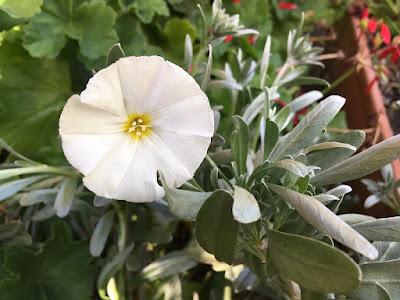
Thank goodness this person started flowering just this morning, right on time for this blog posting. This is Convolvulus cneorum, and around the middle of last year, Pam came to me with a newspaper advertisement from Flower Power nursery, with the photo of Convolvulus cneorum circled, and asked "can we buy this?".
Given it was in the middle of a not very strict set of covid restrictions on shopping etc, I knew this wasn't an ordinary request. Bought it home, planted it in a sunny spot, and it then proceeded to flower its head off with these charmingly simple white disc flowers with a yellow splash in the center. Then it did the unexpected and faded, wilted, looked a bit sick, sickened a bit more, wilted a touch more ... and the conversation had to be had. Do you think it will survive? Let's give it another week or two. It was never going to be my decision to give up on it. It was one of Pam's plants ...Thank goodness we gave it a reprieve, as it bounced back in autumn, kept on growing a bit in winter in a weird, leggy kind of way, and now in early spring it's flowering. Yay!
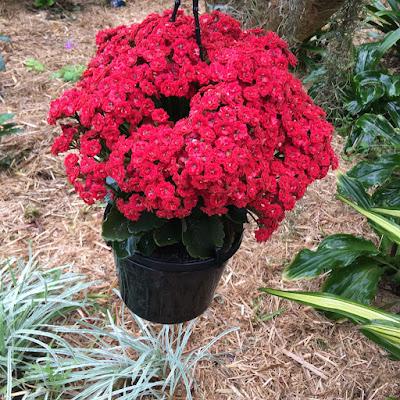
Pam recently brought this dazzler home from a local florist's shop, saying that our main frangipani tree, bare of foliage and flowers in mid-winter, was a good spot for a hanging basket of flowering Kalanchoe. It's the first thing you see when you enter the garden.
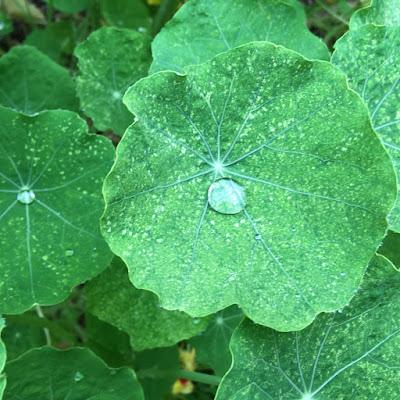
Pam has always loved nasturtiums and I've largely resisted growing them, because they spread and, well ... basically they are pleasant looking weeds. But as her reward for being such a great gardener during my long convalescence, I bought her a packet of nasturtium seeds, and said "you can plant these and let's see what happens". Well, nasturtiums happened, that's what! They do look nice with raindrops on them in the morning.
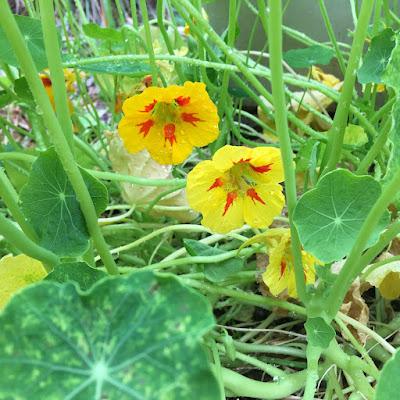
And the flowers produced by our little seed packets come in quite a variety, and they are a favorite subject for Pam's watercolour art students too. They love wandering out into the garden, picking a flower, then doing a painting of it. Good for the soul, painting.
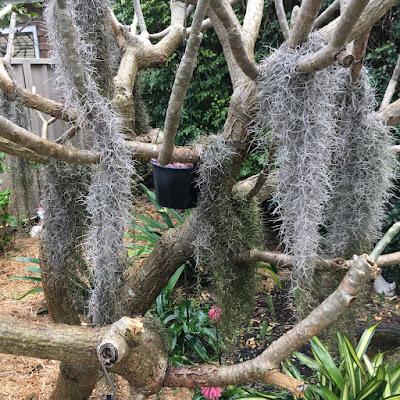
Ever since Pam and I visited the United States in 2011, she has been in love with Spanish moss. All through the Deep South you'd see masses of this ghostly gray "air plant" draped over the branches of giant live oak trees. The streets of Savannah, Georgia, are one of the most unforgettable things I have ever seen on my travels. We came home in love with a plant, and it's been in our garden ever since.
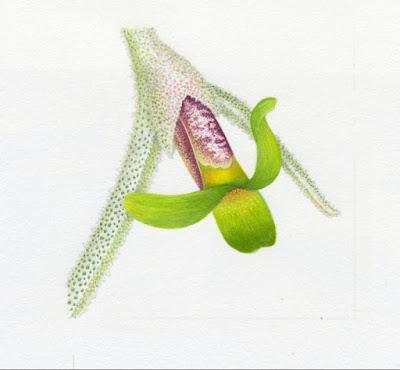
The flowers of Spanish moss are so tiny, about a quarter of an inch across (that's about 5mm) and so Pam's gorgeously detailed painting of a Spanish moss bloom celebrates our garden's tiniest flower by allowing you a glimpse into its small but perfectly formed beauty. Time for a shameless plug, but if you want to see more of Pam's work, pop over to Instagram where she is at @pamelahorsnellartist
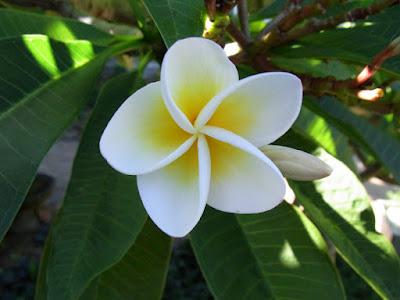
Bending the rules slightly here, as our main frangipani tree has no leaves, no flowers and is still asleep. But it's the biggest of Pam's plants in our garden. She loves this frangipani ...
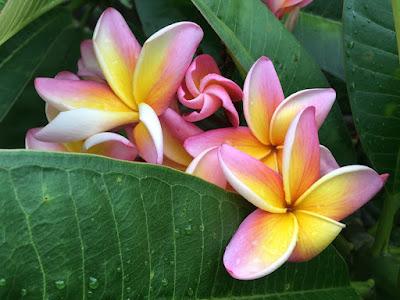
... and she also adores this colourful frangi (also bare in winter) that she brought home from the nearby art studio, called the Bakehouse Studio, where she teaches painting. The parent of this tree is in the backyard at the Bakehouse Studio, so when they trimmed it back one year they turned them into lovely big cuttings which they sold to raise funds for a local school. Pam had always had her eye on this frangipani tree, so she brought it home.
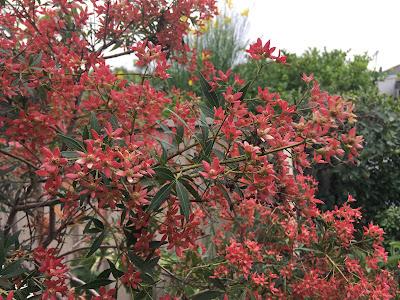
Like the frangipani trees, our New South Wales Christmas bush is not in flower, but it is definitely one of Pam's plants. This poor thing has been having a great time in its pot for the last few years, but it took ages to find a spot where it was truly happy, and every time it was unhappy, where pests attacked it, or the tree itself just looked sick, Pam was onto me. "It's not happy, what's wrong? Let's move it somewhere else? Is that pot big enough? She's taken a special interest in its welfare, and it's rewarding her with better and better color shows each year.
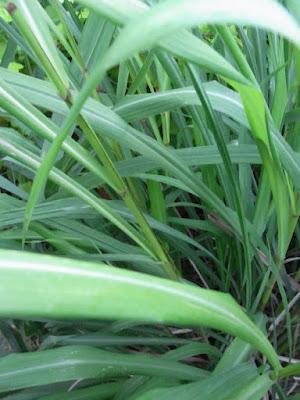
Finally, one of the most recent additions to the roster of Pam's plants is this gorgeous, fragrant jungle of lemon grass. When we planted it, it wasn't an official "Pam plant". It just grew like mad and every now and then we'd cut a stalk when the Asian recipe we were cooking called for lemon grass stalks, chopped.
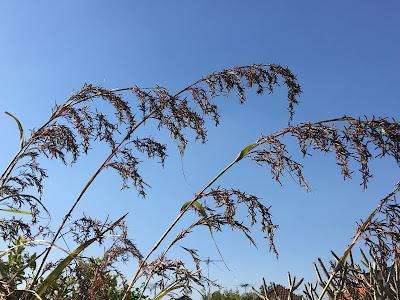
Then, late last year, when my leg was in a cast, I was sidelined and Pam was looking after the garden, the lemon grass needed cutting back. It looked wonderful though, sending up super tall grassy flower spikes high into the air. But to keep the lemon grass clump down to a manageable size and keep it producing those juicy stalks, it needed cutting back. "I guess we could get someone in to do it" I foolishly suggested. "Nonsense, what do you have to do?"
And that's when the lemon grass became Pam's plant. After describing what was involved in cutting back the big, tall, unruly clump of tropical grass, I thought I had put Pam off the idea of doing it herself. Then one morning I could hear telltale sounds coming from the garden. Clip, snip, clip clip. Foliage rustling. More clipping ... she was in there! The clump was a decent size, made up of three plants. It'd be no surprise if a tiger sprang out of the foliage in a surprise maneuver.
But in no time at all Pam had conquered the lemon grass clump, reducing the jungle from six feet tall down to a clump of obedient 12-inch stumps.
That photo of the lemon grass flower heads was taken this morning. I'm almost of a mind to ask Pam if, come October, when it's time to cut it back again, would Pam like to do the honours?
I'm afraid those days are over. She has proven that there's no job she can't tackle in the garden. It's just that with a willing fool standing next to her who's keen as mustard to get stuck into all the gardening jobs, why would she?
No, we're back to our happy zone. Me covered in dirt, her keeping an eye on things.
